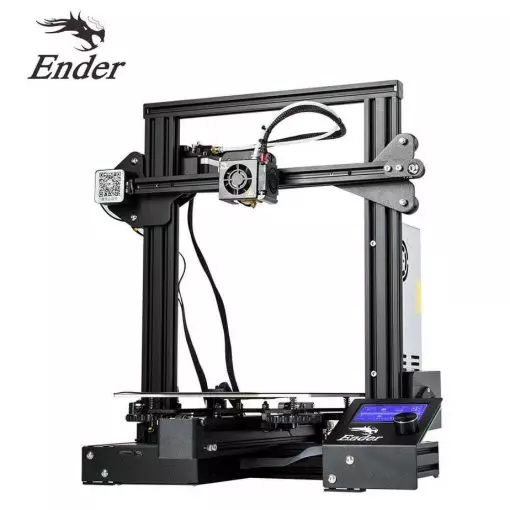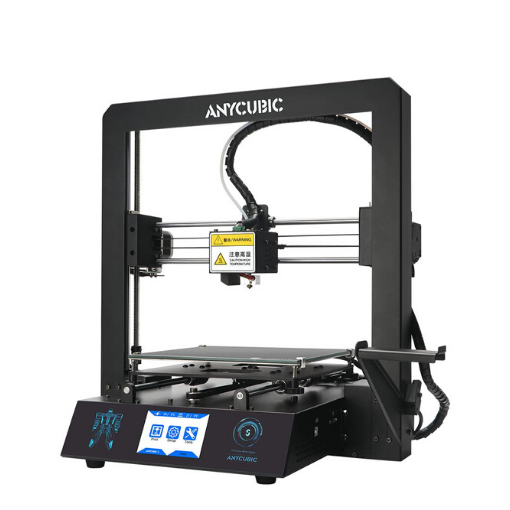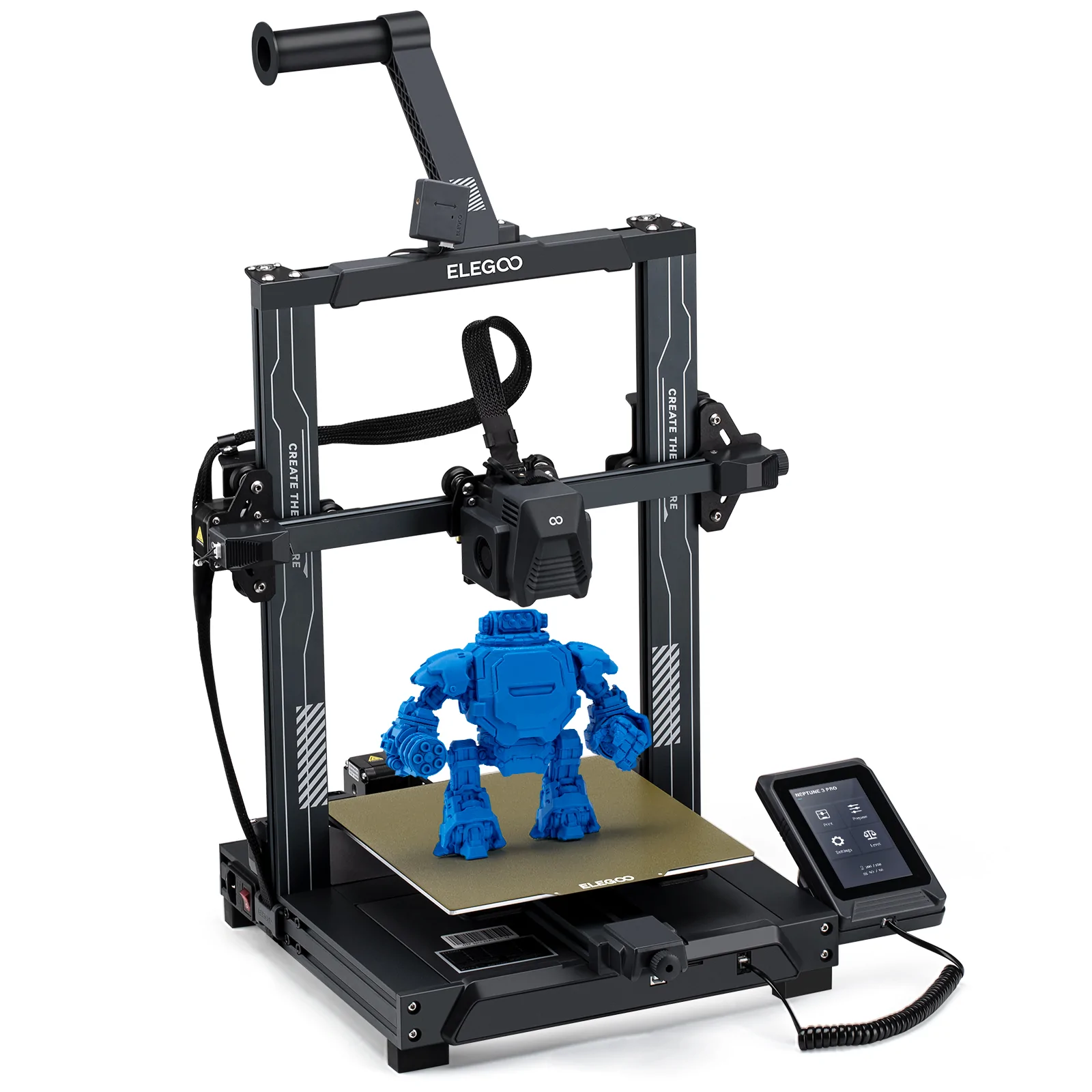Compare Ender 3 vs Mega S vs Neptune 3 PRO
Comparison between the best 3D printers
Choose the best 3D printer at the best price. The cheapest 3D printers are here.
Buy a 3D printer here with 3D Fila.
 |
 |
 |
|
| Model | Ender 3[BUY Ender 3] |
Mega S |
Neptune 3 PRO |
| Printing Material | Filament | Filament | Filament |
| Estimated price | $210,00 | $149,00 | $230,00 |
| Fabricante | Creality 3D | Anycubic | Elegoo |
| Release Year | 2018 | 2019 | 2022 |
| Print Volume [mm] | 220x220x250 | 210x210x205 | 225x225x280 |
| Printer Size [mm] | 440x440x465 | 405x410x452 | 445x515x475 |
| Weight [kg] | 6,62 | 14,5 | 8,1 |
| Power Loss Recovery | NO | YES | YES |
| Enclosed printer | NO | NO | NO |
| Bed Leveling | Manual | Manual | Automatic |
| Filament End Sensor | NO | YES | YES |
| Bed type | Heated | Heated | Heated |
| Power supply system | Bowden | Bowden | Direct Drive |
| Standard nozzle | 0,4 | 0,4 | 0,4 |
| Maximum Nozzle Temperature [°C] | 255 | 260 | 260 |
| Maximum Bed Temperature [°C] | 110 | 110 | 100 |
| Maximum printing speed [mm/s] | 180 | 100 | 80 |
| Filament holder | YES | YES | YES |
| Camera for supervision | NO | NO | NO |
| Recommended filaments | PLA, TPU, ABS, PETG | PLA, TPU, ABS, PETG | PLA, PETG, Tritan, Flex, ABS |
| Recommended slicers | Cura, Simplify, Slic3r | Cura, Simplify, Slic3r | Cura, Simplify, Slic3r, IdeaMaker e outros |
| Maximum Resolution [mm] | 0,1 | 0,1 | 0,1 |
| Processor | 8 bits | 8 bits | |
| Display | Mono | Touchscreen TFT 2,8'' | Display touchscreen 4,3'' |
| Power Supply | 24V / 270W | 12V / 300W | 250 |
| Connectivity | SD / USB | SD / USB | |
| Operating systems | Windows, Mac, Linux | Windows, Mac, Linux | Windows, Mac, Linux |
| Date of registration in the system | 2021-04-13 | 2021-04-15 | 2023-03-02 |
| Release date | 2018 | 2019 | 2022 |
| Extra features | The Ender 3 V1 is a DIY assembly 3D printer, a sales leader since 2017, standing out for its cost-benefit. With a wide printing capacity, it has a CNC machined structure for precision and stability. It offers high-precision prints with low noise, thanks to its innovative V-profile and pulleys. It has a self-adhesive magnetic platform for easy removal of models and excellent adhesion. The Ender 3 heats up quickly, reaching 100°C in 5 minutes, ideal for agile prints. It includes protection against power failures, allowing you to resume printing after interruptions, saving time and material. | The Anycubic Mega S offers a printing platform with excellent adhesion, easy removal after cooling. It has a filament sensor for a better experience with flexible materials and a multilingual and intuitive color touchscreen. Assembly is quick, requiring only 8 screws and 3 connections. It has a large build volume (210 x 210 x 205 mm), high positioning accuracy and supports a variety of materials, including TPU, PLA, ABS and wood. It stands out for its solid metal structure, superior stability, high-quality printing with layer resolution of up to 50 microns, Ultrabase for easy adhesion and removal of parts, resumption of printing after power outage, high-quality extruder for flexible filaments, suspended filament support and stable structure that reduces shaking, improving printing quality. | The Elegoo Neptune 3 Pro printer stands out for its easy assembly and automatic bed leveling, ideal for different levels of users. Equipped with a direct-drive extruder and dual gears, it offers excellent adhesion to slippery materials such as TPU. It incorporates dual screws on the Z-axis, ensuring stable prints, and features an integrated task light for improved visibility. With a PEI-coated build plate and a detachable touchscreen, it combines functionality and convenience. The printer also features an efficient cooling system, filament sensor and a simplified user interface. |
| Support for multiple colors and materials (AMS and CFS) | NO | NO | NO |
Notes * |
|||
| Cost-benefit | 6 / 10 | 7 / 10 | 7 / 10 |
| Hardware | 0.5 / 10 | 2 / 10 | 2.8 / 10 |
| Screen | . | . | . |
| Print volume | 3 / 10 | 3 / 10 | 3 / 10 |
| Performance | 1 / 10 | 1 / 10 | 0 / 10 |
| [BUY Ender 3] |
Conclusion |
| In comparing the three 3D printers—the Ender 3, Mega S, and Neptune 3 Pro—several factors influence which model may be the best choice for potential buyers. **Price and Value:** While the Ender 3 and Mega S are priced lower than the Neptune 3 Pro, they each bring unique advantages that may justify their cost. The Mega S offers a good balance between affordability and features such as a filament sensor and a user-friendly touchscreen. The Neptune 3 Pro, being the most expensive, compensates with advanced features like automatic bed leveling, a direct-drive extruder, and better material compatibility, which can appeal to more experienced users or those who prioritize ease of use. **Print Quality and Build Volume:** All three printers provide adequate build volumes for most standard projects, but the Neptune 3 Pro slightly edges out both the Ender 3 and Mega S in this regard, making it suitable for larger prints. Moreover, the presence of a direct-drive extruder on the Neptune 3 Pro facilitates better printing with flexible filaments, which could be vital for specific applications. **User Experience:** The Mega S and Neptune 3 Pro have notable features enhancing the user experience, such as intuitive touchscreens and improved filament handling. While the Ender 3 is celebrated for its DIY assembly and high precision, it lacks power loss recovery and a filament sensor, which are present in the Mega S and Neptune 3 Pro, making them more user-friendly options. **Overall Performance and Reliability:** The Mega S and Neptune 3 Pro both include features that improve reliability, such as power loss recovery and filament sensors, which can be crucial for maintaining the printing process. In contrast, the Ender 3, while reliable in its own right, may require more hands-on adjustments. **Final Thoughts:** Ultimately, the choice between these printers should depend on your specific needs and preferences. The Mega S is ideal for budget-conscious beginners seeking reliable performance and features, while the Neptune 3 Pro suits users looking for advanced capabilities and ease of use. The Ender 3 remains a strong contender, especially for those comfortable with DIY assembly and seeking a cost-effective option. Each printer delivers good value in its own right, depending on user priorities such as budget, features, and intended use case. |

